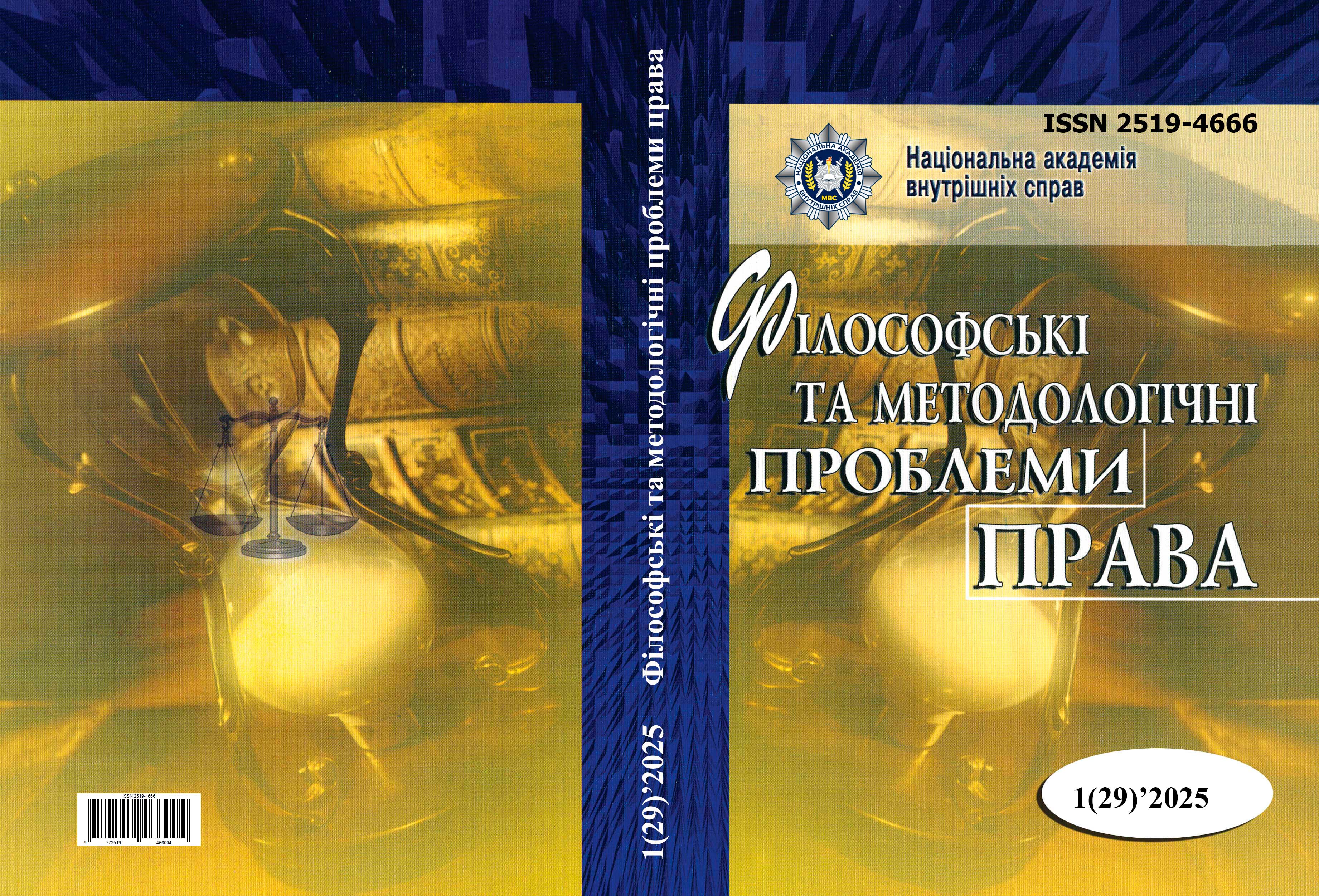Ontological Problems of Lawmaking in Ukraine
Abstract
Abstract. The problem of lawmaking has become relevant again in legal theory and practice in connection with the adoption in August 2023 by the Verkhovna Rada of Ukraine of the Law "On Lawmaking Activity". On the one hand, the Law put an end to fruitless and scholastic discussions about what lawmaking is and what is more important: "lawmaking" or "lawmaking", and on the other hand, it revealed the requirements for an important part of lawmaking activity – lawmaking and the creation of regulatory legal acts. Last year, in the journal "Philosophical and Methodological Problems of Law", we, together with Professor Natalia Kushakova-Kostytskaya, published the article "Philosophical Problems of Lawmaking", which was supposedly a philosophical propaedeutic to the problem of lawmaking. It is clear that this was only a tentative approach to solving the problem of philosophical understanding of lawmaking. It is obvious that there is a need for an in-depth analysis of the ontology, epistemology, axiology, epistemology, and anthropology of lawmaking. This article attempts an ontological approach or analysis of lawmaking as a being, an existential. Probably, an ontological approach to lawmaking requires linking the latter with the existence of society, civil society, and the state, without which lawmaking does not exist, is impractical, and impossible. Also, the ontology of lawmaking is related to the ontology, existence of law and legislation. A study of these points will make it clear the need to develop those provisions that are enshrined in the Law "On Lawmaking Activity."
Keywords: lawmaking; legislation; ontology; existence of law; right; law; civil society; state.
Downloads
References
Andreiev, D.V., Vovk, V.M., Ivchenko, Yu. V., & Pavlyshyn, O.V. (2012). Philosophy of law: current problems and modern interpretations (2nd ed., rev.). Kyiv: NAVS.
Ásta. (2024). Social Ontology: Where Now? Journal of Social Ontology, 10(3), 7-10. DOI: 10.25365/jso-2024-9028
Atoian, O.M. (2010). The Idea of Intuitive Law in the Concept of L. Petrazhytsky. Legal Bulletin, 2(15), 8-11.
Danylian, O.H. (Eds.). (2018). Society, Man, Law: Experience of Philosophical and Legal Understanding. Kharkiv: Pravo.
Daub, J., Geva Brandt, A., Volkmer, S., Northoff, G., & Hirjak, D. (2024). Arthur Schopenhauer: An underappreciated philosopher in psychiatry and his applied epistemology of body and self-experience. Schizophrenia Research, 267, 487-496. DOI: 10.1016/j.schres.2024.04.019
Garcia-Godinez, M. (2024). A deflationary approach to legal ontology. Synthese, 203(64), 207-235. DOI: 10.1007/s11229-024-04487-1
Hegel, G.W.F. (2015). Key Concepts. London: Routledge. DOI: 10.4324/9781315744292
Heidegger, M. (2015). Being and Truth. Bloomington: Indiana Umiversity Press.
Kaufmann, A. (1997). Rechtsphiloosophie. Muncnen: C.H. Beck.
Kennington, R. (Ed.). (1985). The Philosophy of Immanuel Kant. Washington, D.C.: Catholic University of America Press. DOI: 10.2307/j.ctv80c9sp
Kistiakivskyi, B. (1996). Selected Works. Kyiv: Abrys.
Kostenko, O.M. (2020). In the light of social naturalism (selected). Kyiv: Palyvoda A.V.
Kostytskyi, M.V. (2010). Renaissance of natural philosophy or universal (cosmic) laws as a source of law. Academic readings, 15, 22.
Laplantine, Ch., & Mcelvenny, J. (2022). Émile Benveniste. Interviews in the history of linguistics, 1, 61-66. DOI: 10.5281/zenodo.7096298
Maksymov, S.I. (2002). Legal reality as a subject of philosophical understanding (Doctoral dissertation, Kharkiv, Ukraine).
Moiseienkova, S.O. (2015). Anthropological and Legal Determinants of Law Formation. Bulletin of the National University "Lviv Polytechnic". Series "Legal Sciences", 824(6), 272-277.
Okrent, M. (2020). The Truth of Being and the History of Philosophy: A Companion to Rorty. (Chapter 17), (pp. 281-296). New York: John Wiley & Sons Ltd. DOI: 10.1002/9781118972199.ch17
Petrazhytskyi, L.Y. (2011). Selected Works (Vol. 2). I.S. Hrytsenko (Ed.). Kyiv: Lybid.
Quine, W.V.O. (1980). From a Logical Point of View: Nine Logico-Philosophical Essays. Cambridge: Harvard University Press. DOI: 10.2307/j.ctv1c5cx5c
Sasan, J.M. (2023). Existentialism and Its Influence on Our Understanding of Knowledge, Truth, Morality, Values, and Religion. Journal of Learning on History and Social Sciences, 1(1), 40-48. DOI: 10.61796/ejlhss.v1i1.11
Spektorskyi, Ye.V. (2011). Jurisprudence and Philosophy. Philosophy and Encyclopedia of Law at St. Volodymyr University (pp. 381-406). Kyiv: Lybid.
Swift, Dzh. (2013). Gulliver's Travels. Kharkiv: Folio.
Tsymbaliuk, M.M. (2008). Ontology of Legal Consciousness: Theory and Reality. Kyiv: Atika.
Wolf, W.C. (2024). Hegel's Metametaphysical Antirealism. International Journal of Philosophical Studies, 1-22. DOI: 10.1080/09672559.2024.2427591
Abstract views: 117 PDF Downloads: 81
Copyright (c) 2025 Philosophical and Methodological Problems of Law

This work is licensed under a Creative Commons Attribution-NonCommercial-NoDerivatives 4.0 International License.
- Authors reserve the right to authorship of their own work and transfer to the magazine the right of the first publication of this work under the terms of the Creative Commons Attribution License, which allows other persons to freely distribute published work with mandatory reference to authors of the original work and the first publication of an article in this magazine.
- Authors have the right to enter into separate additional agreements on non-exclusive dissemination of the work in the form in which it was published in the journal (for example, to post an article in the institution's repository or to publish as part of a monograph), provided that the link to the first publication of the work in this journal is maintained.
- The journal's policy allows and encourages the posting of articles by authors on the Internet (for example, in electronic storehouses of institutions or on personal websites), both before the submission of this manuscript to the editorial office and during its editorial processing, as this contributes to the creation of a productive scientific discussion and positively affects the efficiency and dynamics of citing the published work.




